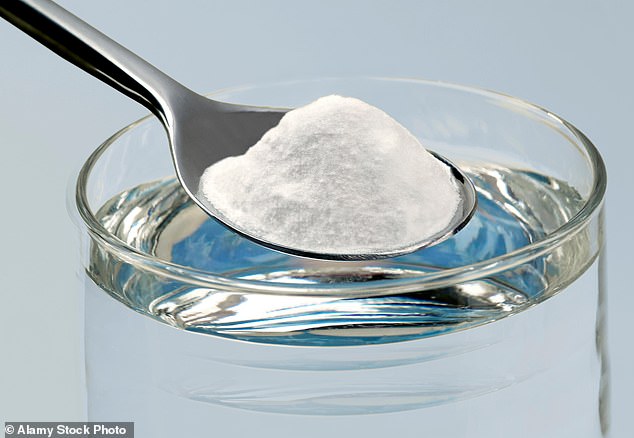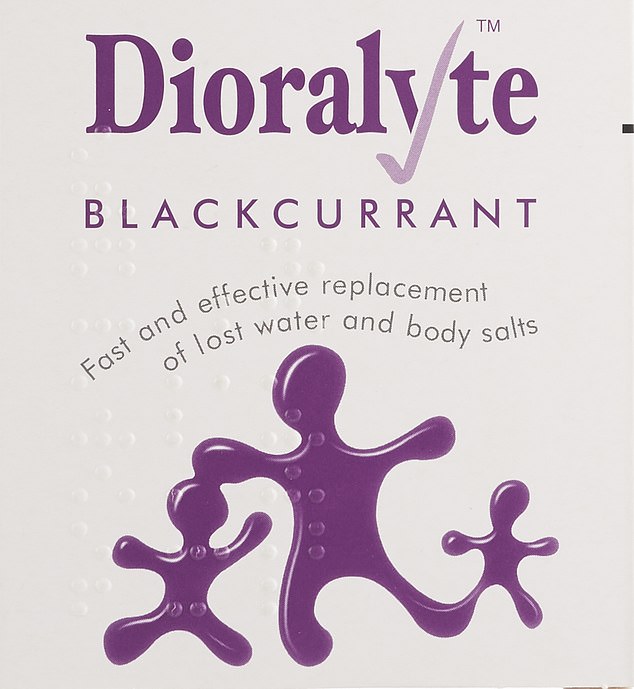The truth about salt-added ‘electrolyte’ drinks touted by celebrities like Gwyneth: Nutritionists reveal whether they REALLY boost energy and brain power – and how to save money by making your own
Once reserved for fitness fanatics, electrolytes are now the latest health and wellness trend. Celebrities like Jennifer Aniston and Gwyneth Paltrow have promoted electrolyte products.
Global sales of such products are expected to grow to £32 billion this year, so it’s no surprise that UK supermarket and pharmacy shelves are stocked with electrolytes in liquid, powder and tablet form.
Claims for them include ‘increasing hydration’, ‘increasing energy’ and ‘improving focus’. So should we all be stocking up?
“Electrolytes aren’t new. They’re just the name we give to common minerals, like sodium and potassium. They create electrically charged particles when dissolved in water,” says Lindsy Kass, a sports and nutrition scientist at the University of Hertfordshire.
Gwyneth Paltrow (pictured) and Jennifer Aniston have both promoted electrolyte drinks
This electrical charge helps regulate the flow of water molecules across cell membranes to maintain hydration levels in our cells. Also called body salts, other important electrolyte-forming minerals include chloride, calcium, and magnesium.
Lindsy Kass says, “These essential nutrients are found in many foods, including fruits, vegetables, nuts, and seeds, and are vital to processes like nerve and muscle function. They also play an important role in keeping the body properly hydrated.”
While it’s well known that the human body is made up of 60 percent water, many may not realize that a third of that is mineral-rich salt water inside each of our cells. That’s why staying hydrated isn’t as simple as just drinking enough water: electrolytes help your cells retain it.
“The body needs these mineral salts because they ensure that the water we drink is transported to the cells and not immediately peed out again,” explains Lindsy Kass.
While drinking more water may seem like an obvious solution, she adds, “it’s not always enough on its own – too much water can be harmful to your health because it dilutes the important minerals in our cells.”

Lindsy Kass, a sports and nutrition scientist at the University of Hertfordshire, says only people who do intense exercise need electrolyte supplements
In rare cases, it is possible to drink so much water that the concentration of salts in the body becomes too low – called hyponatremia. This is where the cells swell as the water level in your body rises, leading to symptoms such as nausea and vomiting, confusion, seizures and unconsciousness.
This is often a risk in extreme circumstances, like running a marathon on a hot day and drinking lots of water without electrolytes. But even then, “just eating a cheese sandwich and a glass of water would keep your salt levels up and make sure you’re getting enough water,” says Lindsy Kass.
We all lose small amounts of electrolytes through sweat and urine, but for most of us, levels are replaced through the foods we eat.
Research shows that low electrolyte levels are only a serious problem if you are in a very hot climate, exercising intensely, or suffering from prolonged vomiting and diarrhea. According to Lindsy Kass, all of these situations cause drastic fluid loss, which flushes out essential salts.
‘In fact, most people in the UK already consume too much sodium (salt), which is found in all electrolyte products. Excess salt is linked to high blood pressure and kidney problems, so people in these risk groups should be extra careful about their intake.’
But what about manufacturers’ claims that electrolytes can also increase energy and concentration?

Electrolytes are the name we give to common minerals, including sodium and potassium, that create electrically charged particles when dissolved in water and help our bodies retain water
This is based on the understanding that being very dehydrated can make you feel tired and that this has an impact on the brain, explains Aidan Goggins, a pharmacist and independent advisor to the supplement industry. Some products also contain B vitamins, for example, which manufacturers are ‘legally’ allowed to say help energy and brain function.
However, Lindsy Kass is clear: ‘There is currently no research to support the use of electrolyte powders or drinks in otherwise healthy people unless they have had severe stomach complaints.’
Another factor to consider with electrolyte products is their high sugar content.
Sugar helps the body absorb water and salt, says Lindsy Kass, but adds, “The key here is that you don’t need a huge amount of sugar to make this happen. Most of us eat enough carbohydrates throughout the day for this to happen naturally.”
Are Electrolyte Supplements Worth the Cost?
Lindsy Kass says, “Most people don’t need extra electrolytes during the first hour of exercise, especially in our mild climate.”
She believes that only people who exercise intensively for long periods of time or in a warm environment will benefit from it.
Also, ‘if you have had an upset stomach or are vomiting and not eating, a ready-made powder contains useful electrolytes such as potassium that you may have lost from your body’.
Otherwise, she says, you don’t need them: ‘If you get enough electrolytes through your diet, you simply pee out the excess – along with your money!’
Aidan Goggins also advises caution. ‘These drinks are basically very basic – a few minerals and some sugar in water. The ability to tweak this formula is limited and so product claims are often driven by clever marketing rather than actual health benefits, in my opinion.’
And if you regularly do heavy workouts, there are cheaper alternatives, says Lindsy Kass.
‘You can make a DIY “sports” electrolyte drink by filling a water bottle with three-quarters water, one-quarter pure orange juice, and a pinch of salt. This works just as well for most people in terms of staying hydrated, and is better than just drinking water after exercise because you’re replacing the minerals you lose through sweat.’
…and how to choose the right ‘electrolytes’ for you
“If you’re buying an electrolyte product, make sure it doesn’t have too much sugar,” says Lindsy Kass, a sports and nutrition scientist at the University of Hertfordshire.
Many products contain between five and seven teaspoons of sugar per serving – and not much of the sodium, potassium or minerals you need to properly rehydrate your body.
“You may be better off opting for a specific electrolyte powder or soluble tablets, as these are formulated to contain high levels of important minerals without the added sugars,” adds Lindsy Kass.
“Coconut water also ticks all the boxes,” says pharmacist Aidan Goggins. “It’s naturally hydrating and offers a low-sodium, high-potassium formula that’s not too sugary, so you get a nice balance.”
However, consult your doctor before taking electrolytes regularly if you suffer from high blood pressure, kidney problems or fluid retention. These substances can worsen these conditions by causing your body to retain fluid.
Products that may be worth trying:
Viridian Electrolyte Fix Liquid, £13.85 for 100ml, viridian-voeding.com
One of the few without sugar, artificial sweeteners or other ultra-processed ingredients, this is a mixture of salt water from the Great Salt Lake in Utah in the US, with good levels of sodium, magnesium, chloride and potassium. It is tasteless.
Dioralyte Blackcurrant, £14.99 for 20 sachets, available from most pharmacies

Dioralyte sachets are good for soothing stomach complaints
The classic stomach remedy contains enough sodium, potassium and sugar to replenish the electrolytes lost through vomiting and diarrhea.
Healthspan Elite Activ Hydrate Citrus, £14.49 for 40 tablets, healthspanlite.co.uk
Dissolve one tablet in water and after a long workout you will have a fruit drink (without sugar) with essential electrolytes.
